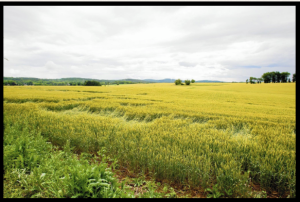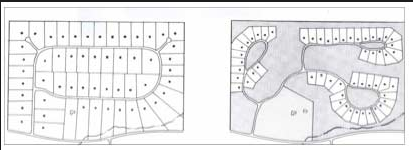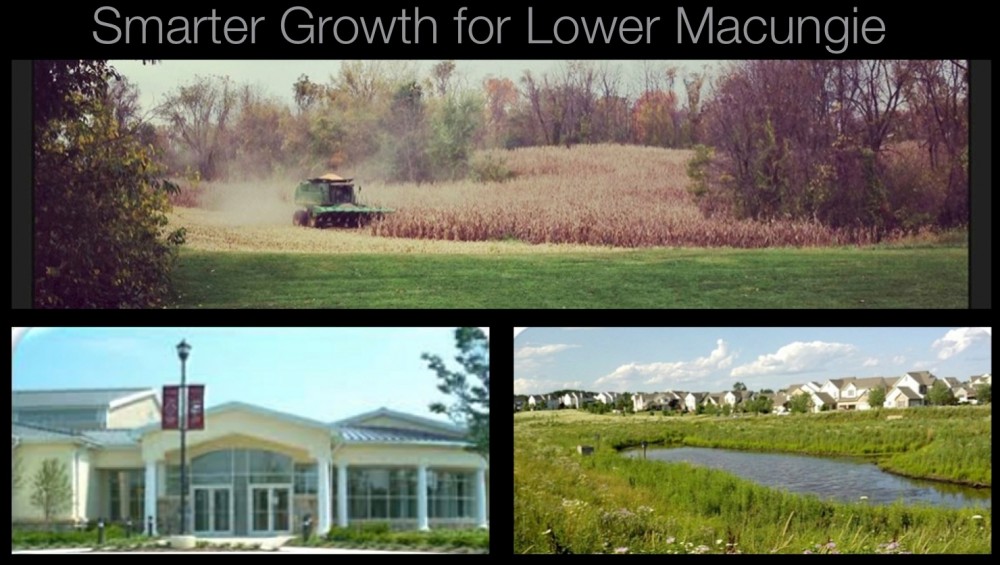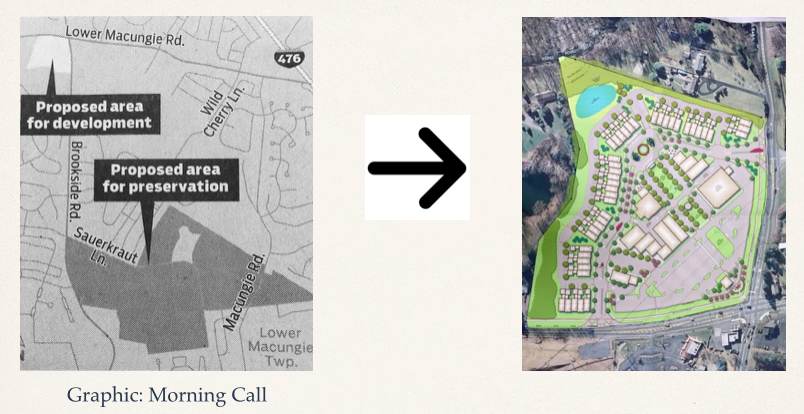I ran for Twp. Commissioner very clearly on a platform focused on farmland and open space preservation. In addition to protecting an irreplaceable natural resource I also believe preservation is linked to the health of our schools, keeping taxes low, protecting property values and our quality of life. Want to keep taxes low? Preserve open space. With about half my term over I wanted to write a post highlighting what we’ve accomplished.

Two weeks ago I had the opportunity to be a panelist at Renew LV’s #saveitorpave it luncheon. I was very proud to be invited to overview the townships efforts. Here is what I shared with a room of about 75 local leaders and advocates. In the last two years Lower Mac has gone from throwing in the towel to having what I believe is one of the most aggressive and comprehensive preservation strategies in the Valley.
Lower Mac’s 6 pronged strategy. Using all the tools in the toolbox.
#1 The township is about to adopt an official map.
This was a goal outlined in my campaign. An official map is a combined map & ordinance designed to implement the goals and community vision set forth in adopted comprehensive plans. Basically if a preservation priority is on a municipal official map, once a developer notifies the municipality of their intention to subdivide, the municipality has up to a year to confirm its acquisition interest and negotiate to acquire the land. This will be the townships first line of defense. It makes sure the township has a fighting chance to preserve a property while respecting private property rights.
Learn more here – What is an official map.
#2 Zoning
We learned the hard way that zoning alone is not enough to protect our community. For over two decades the township relied primarily on agricultural protection zoning to preserve large swaths of prime farmland.
We all now know that an unfortunate number of circumstances combined in 2010 with a very pro developer Board of Commissioners and resulted in the loss of 700 acres of farmland that was for over two decades zoned protected. Zoning is one tool to keep in the toolbox, but zoning alone cannot be relied on to permanently protect farmland. It is not permanent and it is political. The wrong board can overturn protection zoning.
To this end the township planning commission has been instructed to work on a new conservation by design ordinance. Locations where growth is inevitable; smarter growth is the goal. Conservation by Design provides the opportunity for adding land to a community-wide network of open space. It manages growth while protecting natural and cultural resources for little or no public cost. It differs from traditional cluster developments in that it establishes higher standards for both the quantity and quality of open space.

Sprawl zoning on the left eats up all the open space. Conservation zoning on the right preserves and protects open space and natural features.
#3 The County Farmland Preservation Program. Lower Macungie now has 4 more properties with active applications in the county farmland preservation program! The county program purchases developments. When this happens enrolled properties are permanently protected farms. If all the farms with active applications are selected and preserved we could have nearly 300 more acres of protected farmland in Lower Macungie Twp by 2017. An important part of this strategy is identifying potential tracts and making sure owners are informed about preservation opportunities and benefits.
A 5th farm property went through the final step to preservation earlier this year. We now have an additional 55 acres of new preserved farmland off of Mountain Rd.
Lower Macungie commits funds to preserve 55-acre Heim farm
#4 Funding
I believe in market preservation. This means compensating landowners for their development rights or outright acquisition. To do this we need to fund programs. In the 2016 budget the township did this with a 500,000 line item and an additional 150,000 we can leverage with the county municipal match program. Muni match is a pilot program championed by County Commissioner Percy Dougherty and modeled after the very successful Northampton County program of the same type.
Turning 200,000 to 800,000 for farmland preservation.
#5 Transfer of Development Rights (TDR) is a market-based program that allows landowners to sell or transfer development rights from one property to a developer or landowner of another property who can use those rights to increase density of development.
In the case below we have a 200 acre agriculture property on our draft official map designated for preservation. Since the same landowner owns a 16 acre property that’s in an area designated for some targeted mixed use or village center density we can take advantage a TDR to transfer density to a more appropriate location. The result is promoting both the townships smart growth and preservation goals at the same time.
Family and township pursue transfer of development rights to protect 200 acre farm.
6. Act 4 reauthorization
Farmers and farmland generate a surplus of .75 cents on every dollar of taxes collected. This means farms pull their weight. And act 4 let’s us give them a break on tax increases.
Years ago Act 4 amended Pennsylvania’s Open Space Lands Act to allow counties, school districts and municipalities to reward landowners who have chosen to permanently preserve their land with conservation easements by freezing their property tax millage rates.
Lower Macungie, East Penn School District and Lehigh County all have Act 4 tax freezes instituted. End of last year we sent a letter to the Lehigh County Admin and Commissioners encouraging them to re-authorize Act 4. This means as an incentive to preserve, once a farm is in permanent protection landowners get a permanent tax freeze. This also helps farmers remain viable from a business perspective by shielding them from school property tax increases. This is a fair trade since in most cases by not developing their land they are helping to avoid over crowded schools.

